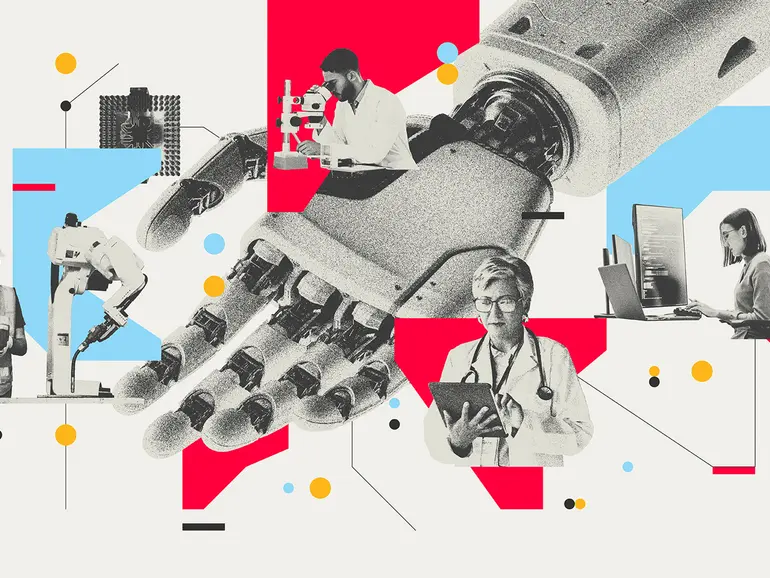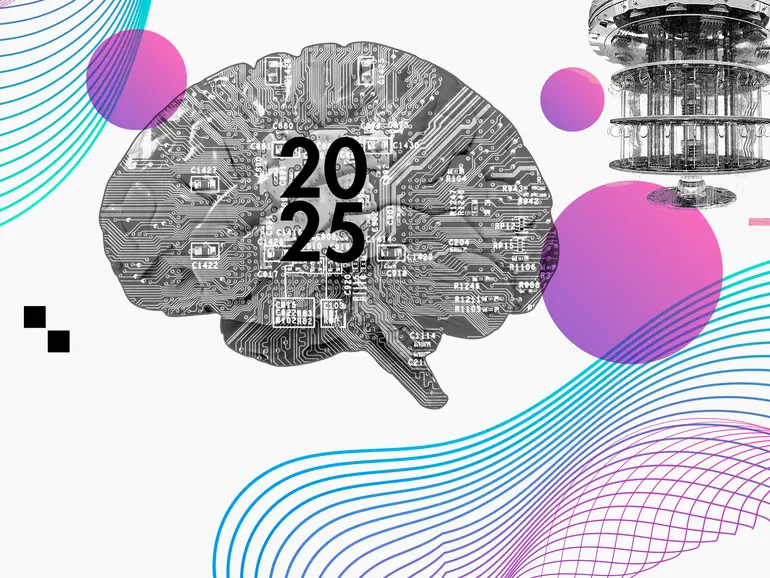Choose the human path for AI
To realize the greatest gains from artificial intelligence, we must make the future of work more human, not less.

Faculty
Daron Acemoglu is an Institute Professor of Economics in the Department of Economics at the Massachusetts Institute of Technology and also affiliated with the National Bureau Economic Research, and the Center for Economic Policy Research.
In 2024, Acemoglu received the Sveriges Riksbank Prize in Economic Sciences in memory of Alfred Nobel, joint with Simon Johnson and James A. Robinson, “for studies of how institutions are formed and affect prosperity.”
He is an elected Fellow of the National Academy of Sciences, the British Academy, the American Philosophical Society, the Turkish Academy of Sciences, the American Academy of Arts and Sciences, the Econometric Society, the European Economic Association, and the Society of Labor Economists.
Daron Acemoglu received a BA in economics from the University of York, 1989, an MSc in mathematical economics and econometrics from the London School of Economics, 1990, and a PhD in economics from the London School of Economics in 1992. Since 1993, he has held the academic positions of Lecturer at the London School of Economics, and Assistant Professor, Pentti Kouri Associate Professor, and Professor of Economics at MIT.
He is the author of six books: Economic Origins of Dictatorship and Democracy (with James A. Robinson), Introduction to Modern Economic Growth, Why Nations Fail: The Origins of Power, Prosperity and Poverty (with James A. Robinson), Principles of Economics (with David Laibson and John List), The Narrow Corridor: States, Societies, and the Fate of Liberty (with James A. Robinson), and Power and Progress: Our Thousand-Year Struggle Over Technology and Prosperity (with Simon Johnson).
His academic work has been published in leading scholarly journals, including the American Economic Review, Econometrica, Journal of Political Economy, Quarterly Journal Economics and Review of Economic Studies. His research covers a wide range of areas within economics, including political economy, economic development and growth, human capital theory, growth theory, innovation, search theory, network economics and learning.
Daron Acemoglu has received numerous awards and fellowships, including the inaugural T. W. Shultz Prize from the University of Chicago in 2004, and the inaugural Sherwin Rosen Award for outstanding contribution to labor economics in 2004; Distinguished Science Award from the Turkish Sciences Association in 2006; the John von Neumann Award, Rajk College, Budapest in 2007; the Carnegie Fellowship in 2017; the Jean-Jacques Laffont prize in 2018; the Global Economy Prize in 2019; and the CME Mathematical and Statistical Research Institute prize in 2021.
He was awarded the John Bates Clark Medal in 2005, given every two years to the best economist in the United States under the age of 40 by the American Economic Association; the Erwin Plein Nemmers prize awarded every two years for work of lasting significance in economics in 2013; and the 2016 BBVA Frontiers of Knowledge award in economics.
He holds Honorary Doctorates from the University of Utrecht, the Bosporus University, University of Athens, Bilkent University, the University of Bath, the Ecole Normale Superieure, Scaly Paris, and the London Business School.
His book (joint with James A. Robinson) Economic Origins of Dictatorship and Democracy received the Association of American Publishers Award for Professional and Scholarly Excellence, and the William Riker Prize for Best Book Published in Political Economy, the Woodrow Wilson Foundation Award for Best Book Published on Government, Politics or International Affairs. Why Nations Fail also received several prizes and awards, and was a New York Times bestseller in 2012.
His new book, Power and Progress: Our Thousand-Year Struggle Over Technology and Prosperity (joint with Simon Johnson) was published in May 2023.
Acemoglu, Daron and Simon Johnson, Working Paper. May 2024. NBER Working Paper No. 32416.
Acemoglu, Daron, Working Paper. May 2024. NBER Working Paper No. 32487.
Capraro, Valerio, Austin Lentsch, and Daron Acemoglu et al., Working Paper. December 2023.
Acemoglu, Daron and Simon Johnson. New York, NY: PublicAffairs/Hachette Book Group, 2023.
Acemoglu, Daron. MIT Press, 2021.
Daron Acemoglu, Andrea Manera, and Pascual Restrepo. In MIT Work of the Future, Research Brief, Cambridge, MA: September 2020.

To realize the greatest gains from artificial intelligence, we must make the future of work more human, not less.

They’re nearly all about artificial intelligence, with a guest appearance from quantum computing.
Institute Professor Daron Acemoglu wrote: "By granting ICE agents de facto immunity, the Trump administration has given them a green light to ratchet up their violent tactics. If this violence goes unchecked, it could indeed be a turning point, because it will create a template for other security forces more closely aligned with Trump to use force against any manifestation of opposition."
In their book "Power and Progress," professor Simon Johnson and Institute Professor Daron Acemoglu narrate the calamitous failure of the French Panama Canal project in the late 19th century. The problem, Johnson and Acemoglu write, was that the vision for progress did not include everyone — and failure to incorporate feedback from others resulted in poor quality decision making.
In this video interview, Institute Professor Daron Acemoglu discussed the importance of Federal Reserve independence and the impact of AI on the economy.
Institute Professor Daron Acemoglu wrote: "Not only will the expansion of Trump's executive powers create havoc in the next three years and continue to enrich him and his family. But it will also change American politics fundamentally, whether it's a Democrat or Republican who succeeds him. That's the real danger that follows from the theory of Trump."